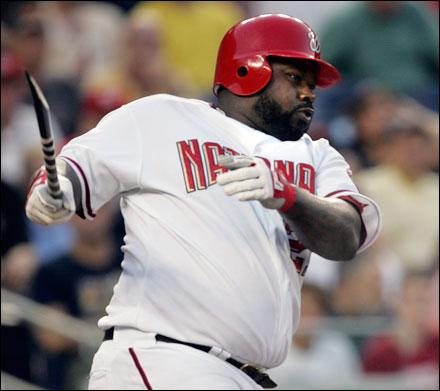 Tuesday we learned that Scott Boras may be pushing for an opt-out clause on Prince Fielder's next contract. Due what Boras is looking for for Prince and what he has done with similar contracts he has negotiated in the past (CC Sabathia) we may interpret this to mean that the opt-out will come after three years. While normally this is a bonus in the player's favor -- it gives him the opportunity to leave for more money if he performs well, but leaves the team holding the bag if he does not -- this may be a rare case where a player opt-out is a benefit to the team.
Tuesday we learned that Scott Boras may be pushing for an opt-out clause on Prince Fielder's next contract. Due what Boras is looking for for Prince and what he has done with similar contracts he has negotiated in the past (CC Sabathia) we may interpret this to mean that the opt-out will come after three years. While normally this is a bonus in the player's favor -- it gives him the opportunity to leave for more money if he performs well, but leaves the team holding the bag if he does not -- this may be a rare case where a player opt-out is a benefit to the team.In November I examined the potential for Fielder as a free agent and found him likely to get a contract of six years and as much as $150 MM. I also explored his production over the next six years, and projected an imminent decline of:
2012: 4.8
2013: 4.5
2014: 4.2
2015: 4.3
2016: 3.7
2017: 2.8
If the contract is spread out evenly (it likely won't be, but I digress), this means that for the first three years Fielder will be earning $75 MM for 13.5 wins -- a fair price at an average of $5.25 MM per win over the next three years. If an opt-out were included, this leaves Fielder with their finger on the trigger for another $75 MM, but this time for just 10.8 wins.
Where the value of Fielder opting out lies, though, is in him actually doing it -- opting out. Knowing that his decline is oncoming, it is unlikely that he would turn down that much money in that short span, but what would precede his opting out would be his performance; Fielder would have to play extremely well for him to consider getting a longer deal and more money, and therefore to opt out.


Prince?
This leaves the team in a win-win situation. First, Prince plays extremely well in the first years of the contract, even better than the All-Star player you're paying him to be. Then, after he has outplayed his enormous contract, he opts out, leaving $75 MM in the team's coffers and taking his presumably-on-the-precipice-of-decline self out onto the free agent market.
Giving a player an opt-out clause, like giving anyone anything that isn't a disease, is generally a plus for them, and this is no exception. Fielder would do well to have an opt-out clause; it is extra leverage for him in the future, as well as both the potential for a better contract in 2014 and an awesome golden parachute (the back-half of that $150 MM deal). What I am saying here is that there may be a silver lining to offering a player like Fielder, in this rare instance, an opt-out clause -- especially if it is the thing that puts your team over the hump in negotiations for him, or even gets him to knock a few million dollars off his price tag (lolBoraslol).
Giving a player an opt-out clause, like giving anyone anything that isn't a disease, is generally a plus for them, and this is no exception. Fielder would do well to have an opt-out clause; it is extra leverage for him in the future, as well as both the potential for a better contract in 2014 and an awesome golden parachute (the back-half of that $150 MM deal). What I am saying here is that there may be a silver lining to offering a player like Fielder, in this rare instance, an opt-out clause -- especially if it is the thing that puts your team over the hump in negotiations for him, or even gets him to knock a few million dollars off his price tag (lolBoraslol).
No comments:
Post a Comment